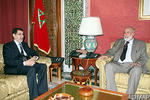by Nafissa Assed.
Introduced many centuries ago, Arabic has long been the official language of Libya. . . .[restrict]It is spoken by the majority of the population as a main language.
English was taught in schools but during a certain period in the early 1980s and 1990s, the learning and speaking of other languages, especially English, was sidelined by Qaddafi with all public writing and communication having to be in Arabic. The regime’s view was that English was the language of “obnoxious colonialism.”
Although this changed in the last decade, learning foreign languages was not a priority in Libya until recently. Libyans are now fully convinced of the importance of improving the inadequate standards of English teaching and the necessity of increasing the number of teachers trained to teach the language.
After over four decades of oppression and eight months of a bloody war, today everyone in Libya is excited about living a good life and working to improve their educational levels. They want to get out of their armchairs and start learning English. They believe that learning English will give them unlimited access to knowledge of their favorite subjects. Although Qaddafi banned teaching English in schools for a long time, many Libyans were nonetheless keen to learn the language through TV, music, websites, magazine, movies and the like. Libyan youth, in particular, hold a positive attitude about learning English and they have a desire to learn despite the difficulties.
A few days ago, I had a conversation with Ali, my taxi driver, about Libya just before the 17 February Revolkution and he told me: “The thing I feel most sorry about in Libya is education. Qaddafi kept us ignorant in order to control us and he robbed us of the right to learn languages so we wouldn’t know what was going on in the outside world. I hope the elected government will take care of education and spend as much as they can to teach our kids English and other languages. I want to see my kids speak English fluently just like the kids in Tunisia speak French without any difficulty.”
Qaddafi, who understood English but hated Western culture with a passion, was always opposed to any Western language, always speaking Arabic to his foreign guests who had to rely on translators. He banned the printing of newspapers in English in an attempt to remove all Western influences from Libya.
The regime not only stopped Libyans from learning foreign languages but it also closed the faculties and departments of languages in all Libyan universities and, because of Qaddafi’s ideology, banned many books from entering Libya. The students at schools were able to successfully pass exams merely through proving their patriotism and loyalty to the regime or simply by showing their good relations with the system either directly or indirectly.
Before the revolution, many Libyans read only the sports pages in local newspapers and didn’t even look at anything else. Indeed it has been said that they used the political pages for cleaning windows and wrapping gifts.
But time has changed and freedom of expression and speech finally returned to Libya. After Libya became free, dozens of private newspapers sprang up all over Libya in different languages including English.
About a month ago I watched a report on Libya Al-Ahrar Channel showing women from Tobruk in their fifties who had a great interest in learning English. They have English textbooks and go to school to take English lessons every day after they complete their housework.
The women openly stated: “We had a great passion for learning English and music and both were banned by the regime. But the 17 February Revolution opened the doors to schools for us and now we want to learn English after many years of being prevented to do so.”
Another student from Tripoli University said: “We were deprived of a great deal during the days of oppression and cruelty, so now we want to know and learn everything we could not because of Qaddafi.”
Schools and learning in Qaddafi’s Libya were all about following instructions, never about thinking for yourself or what you really wanted. But now I can see the ropes have loosened and Libyans have begun to do and say what they feel. Long ago, I didn’t see any signs in English; all were in Arabic. Today I see Libyan papers and magazines in English; more Libyans have the courage to speak and write in English, knowing there are plenty of readers who want to read what they say.
In addition, for the first time since the liberation of Libya, over three hundred people gathered at the Rixos Hotel for the first ever TEDx Tripoli event in English. That was an encouraging number for a country that was prevented from using English for more than 20 years. The American educational fair held in Tripoli in 2011 at which more than 30 American educational institutions were represented was another sign of how interested LIbyans are in learning English.
It is inspiring to discover the number of Libyans who want to learn English; the number is large and it is increasing as Libya embarks on a new era in world relations and opening up to foreign investment. Under these circumstances, learning languages, especially English, is becoming a necessity and a key to success in business and study, let alone facilitating the search for a job.
I believe it takes only one good reason to learn English. Libyans have many reasons and a clear awareness of the significance of English. Many are not proficient in English and many more don’t even speak it yet they like it and are keen to learn it. It has become imperative to speak English in today’s competitive job market.
Whatever the reason people have for learning English, they will never regret it for English is one of the most widely-spoken languages in the world as well as one of the most taught.

Nafissa Assed has writes for numerous blogs and on-line publications. She is a former Libyan exile who was born and brought up in Morocco. Her father returned in 1990 but was murdered by the Qaddafi regime in Libya. After his death she lived with her grandfather, Mohamed Othman Assed, who was prime minister of Libya from 17 October 1960 to 19 March 1963. In 2010, she moved to Libya full-time, hoping to use her media skills for the cultural healing and rebuilding of my society.
After the Libyan revolution started, she wrote anonymously from Tripoli on what was going on inside the country. [/restrict]





